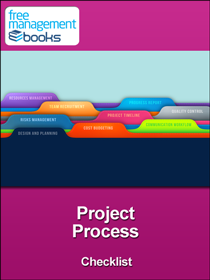Project Management Process Checklist
 |
||
 |
||
This project management process checklist details the five phases of a project, and details the actions and responsibilities you must fulfill to ensure your project is successful.
To be a successful project manager you need to have a comprehensive understanding of what is required in the five basic phases of project management.
The commonly accepted phases of project management are:
• Initiating
• Planning
• Executing
• Monitoring & Controlling
• Closing
For your project to be successful you need to follow each of the process groups logically. You will need to perform the processes at a project level first and then repeat in greater detail for each phase or sub-phase, as your project requires.
![]()
![]()
Stage 1 - Initiating Processes
This is where you need to define the project and any sub-phases required and then seek authorization for your project. As part of the initiating process you will need to develop a project charter.
This is a document that denotes the formal start to the project and provides high-level details. This includes the business case for your project, its return on investment and how its success will be measured.
It also needs to detail its resource requirements, its budget, and timeframe with major milestones and show an assessment of risks faced. Finally it needs to define the level of authority required; the project stakeholders involved and name you as its project manager.
Stage 2 - Planning Processes
Once you have gained approval for the project the next phase of activities is in your planning. It is at this second phase that you produce the project plan that contains all the pertinent information required for a successful project.
It is essential that you do not rush these activities, because this plan forms the foundation of all subsequent plans and project documentation. You need to meticulously compile and agree a detailed scope of your project and its sub-phases. Your plan can then integrate all the project baselines (scope, schedule and costs) and management plans (communications, change and configuration plans) required for the project.
Your project plan is not a static document it will evolve as your project develops and therefore have several iterations throughout its life-cycle.
Stage 3 - Executing Processes
You now have your project plan and can begin its implementation, ensuring that the planned deliverables are achieved at each sub-phase, as well as for the whole project.
The processes during the executing phase provide the work performance data, such as, deliverable status, details of incurred costs & schedule progress. It ensures that project requirements and milestones are attained and all interested parties and stakeholders are kept informed of its progress.
As project manager it is vital that you manage project members, stakeholders and suppliers well and establish good communication channels.
Stage 4 - Monitoring & Controlling Processes
At this fourth phase of your project you need to be focused on tracking and reviewing your projects progress. An essential aspect of these processes is the identification, risk assessment, approval and management of any required changes.
Your role as project manager at this phase requires you to monitoring actual performance against that of the project management plan. A key aspect of this activity is to identify potential or actual risks to your project, define preventive actions and recommend resolutions to correct them
Many projects use a Change Control Board (CCB) to mange this process and ensure the appropriate stakeholders are involved and the project aims are achieved.
Stage 5 - Closing Processes
This is the final phase of your project and where your 'customer' or 'end user' formally signs off and accepts each project phase. The project is officially 'closed' when the deliverables and exit criteria have been achieved as outlined in your project plan. Closure also includes your 'customer' or 'end user' accepting the maintenance, support and use of the deliverables, as well as all project documentation.
The final action for you as project manager is to hold a post implementation review (PIR) where any lesson learnt can be discussed and documented so that future projects can benefit from this experience.


